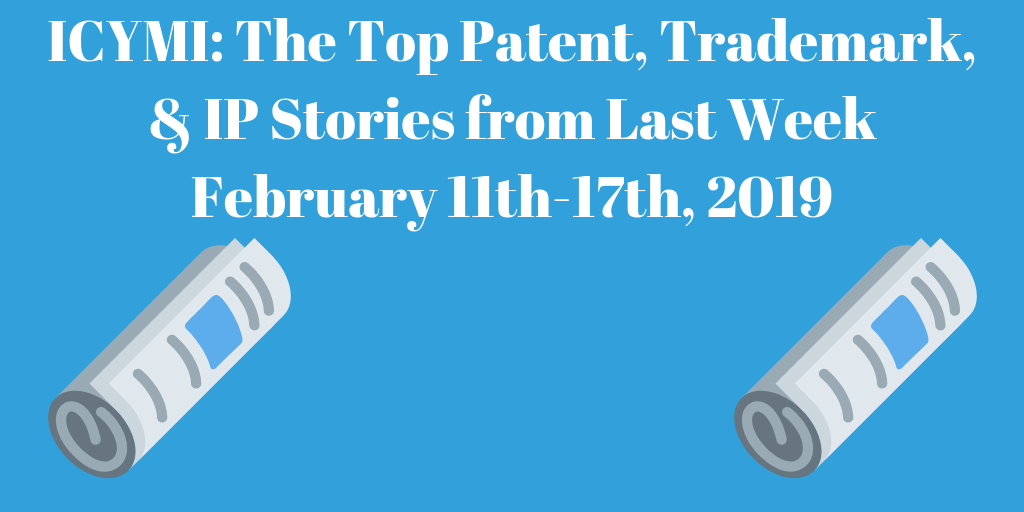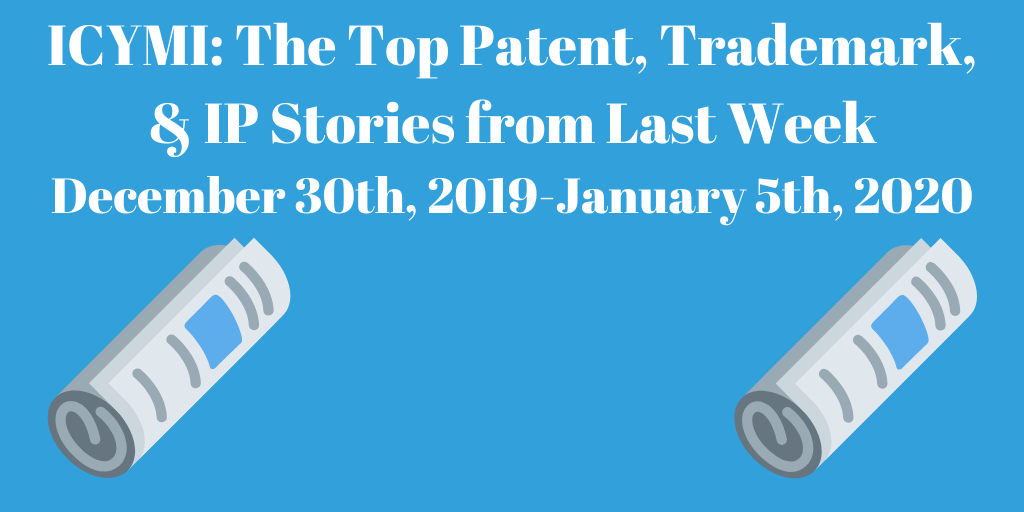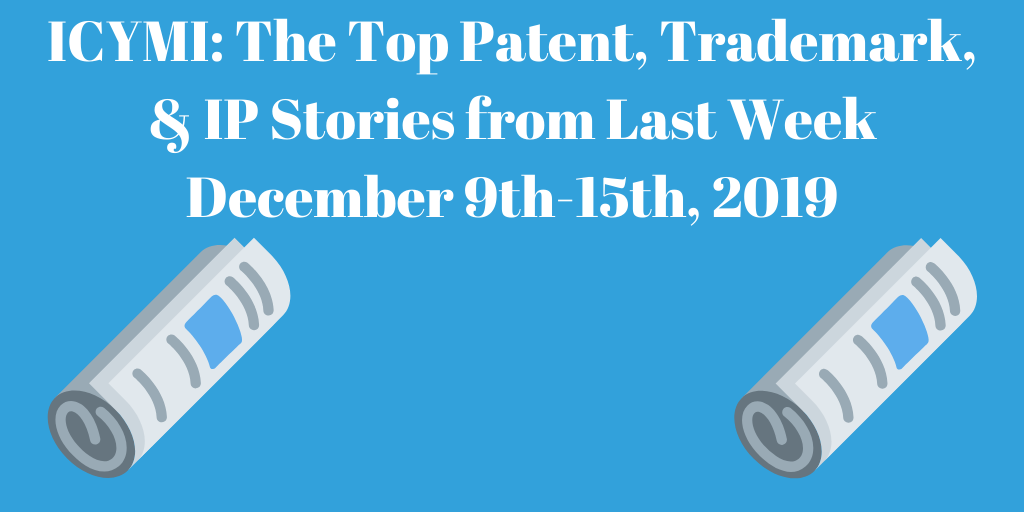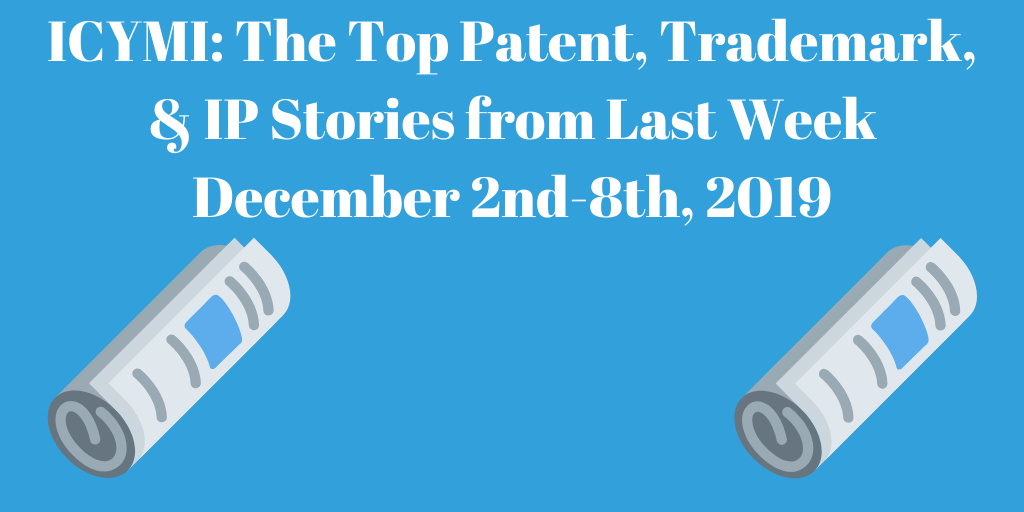Top Patent, Trademark, and IP Stories from Last Week (2/11-2/17/19)
ICYMI: The Top Patent, Trademark, and IP Stories from Last Week (February 11th-17th, 2019)
Every week, we will be highlighting the top patent, copyright, trademark, intellectual property, etc. stories of the previous week in our “In Case You Missed It” segment. The list itself is in no particular order and includes a wide range of stories from the patent world that are informative, noteworthy, or just plain bizarre. The stories included encompass everything from Supreme Court cases to insights into emerging industries. Please feel free to comment your thoughts on the stories or share an important one we missed!
1.) “Apple Patent Describes Unlocking a Vehicle With Face ID”
In a 2017 patent application recently made public, Apple laid out plans for a system to use its Face ID biometric security system to control entry into vehicles. A driver would simply show their face and the car would recognize them, unlocking the doors. Such an application of the Face ID technology could pave the way for a truly keyless world.
In its reasoning for the patent, Apple states that traditional keys and key fobs are “single factor security systems” that “offer only a low level of security,” vulnerable to man-in-the-middle attacks or theft. The biometric security system however would add an extra level of security, granting access to the vehicle only after the driver responds to the request for authentication by showing their face.
Apple’s blueprint for the system, shown below, would require a processor to transmit and receive communications, including:
- transmit a first communication;
- receive a second communication in response to the first communication;
- determine an approach vector based on the first communication and the second communication;
- compare the approach vector with a known approach vector and transmit a request for authentication based on the comparison;
- receive a response to the request for authentication; and
- grant access to an asset based on the approach vector and the response to the request for authentication.

Back in 2017, rumors of an Apple car were swirling however the recent layoff of 200 “Project Titan” employees may put that dream, and this one, on the backburner for awhile. To read more about this story, click here (via PCMag, February 12th, 2019).
2.) “Carlton Dance Not Eligible for Copyright, Government Says”
A little while back we told you about Alfonso Ribeiro, famous for his role as Carlton on the hit 90’s show The Fresh Prince of Bel-Air, who sued video game maker Epic Games over their use of his hallmark dance in their game Fortnite. The dance was clearly a nod to Ribeiro’s iconic moves featuring his classic arm swinging and hip swaying. In December, Ribeiro joined other performers in suing the game over alleged theft of signature dance moves.
In his lawsuit, Ribeiro argued the dance portrayed in the game was “distinctive, immediately recognizable, and inextricably linked to Ribeiro’s identity, celebrity, and likeness.” Despite such efforts however, the USPTO did not feel the same way, declaring the routine “simple” and not intricate enough for copyright eligibility. The dance, in which Carlton swings his arms and hips repeatedly, was ruled not complex enough to clear the bar.
Robert Brauneis, co-director of the intellectual property program at George Washington University Law School, agreed with the decision, stating that the dance, constructed from simple, repetitive motions, is “like a word or a short phrase” and that “repetition doesn’t make the fragment subject to copyright protection.” To read more about this story, click here (via New York Times, February 15th, 2019).
3.) “U.S. Patent and Trademark Office Releases New Report on Trends and Characteristics of U.S. Women Inventors”
Last week, the USPTO released a report on the trends of female American inventors named in granted patents from 1976-2016. The report, “Progress and Potential: A Profile of Women Inventors on U.S. Patents,” showed that the share of patents including at least one female inventor increased 300% from the 1980’s. Despite such progress, females comprised only 12% of all inventors granted patents in 2016. Nonetheless, this is still approximately double the share of women in the 1980’s.

The report indicates such disparity may be due to the fact that women make up only 28% of the science and engineering workforce, a field which naturally yields the most patents. As women have increased their participation rate in such fields, their invention rate has also increased.
The researchers found that women are among the “Lost Einsteins,” people who would otherwise contribute valuable inventions had they only had exposure to innovative role models and resources early on. The USPTO stated they will be working with “industry, academia, and other government agencies to identify ways to increase the number of women inventors in all sectors of our economy.” To read more about this story, click here (via USPTO, February 11th, 2019).
4.) “European Union Agrees to New Copyright Law”
Despite months of outcry from tech giants and internet activists alike, the European Union agreed on one of the most controversial copyright laws in modern history, moving to a final vote in late March. The proposal would make internet behemoths liable for any copyright violations uploaded to their site, even those uploaded by users. Additionally, it would require news aggregators such as Google News to obtain licenses from news publishers to display their stories. Any search results featuring beyond one word from an article would be subject to license.
Opponents of the bill argue such restrictions would hurt small internet companies the hardest, requiring extensive content upload filtering and resources to operate. European users would also be affected, reducing their choice for content and access to unconventional journalism.
Controversial Article 13 states such a law will “in no way affect legitimate uses” who will still be able to use copyrighted content for purposes of parody, criticism, review, etc. but activists are still critical. “Filters will subject all communications of every European to interception and arbitrary censorship if a black-box algorithm decides their text, pictures, sounds or videos are a match for a known copyrighted work,” international online rights group Electronic Frontier Foundation stated in their blog.
Although this is happening across the pond, such a proposal could very well be implemented in the United States one day as law makers struggle to catch up to the evolving nature of the internet. Such a proposal, if passed, could have worldwide implications on how we share information. An entire continent could have a reduced access to commentary and ideas. To read more about this story, click here (via Wall Street Journal, February 13th, 2019).




